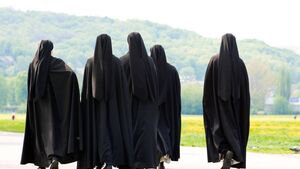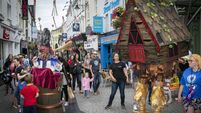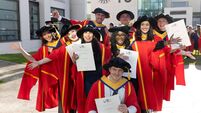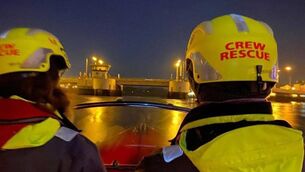'The Last Irish Missionaries': RTE honours heroic work of Irish Missionaries abroad

The programmes charted the remarkable work of the Irish Missionary Movement in Africa, Asia, and South America. Stock image
Broadcasters Dearbhail McDonald and Bryan Dobson co-hosted two programmes entitled, 'The Last Irish Missionaries', which were televised on RTÉ in the last two weeks.
The programmes charted the remarkable work of the Irish Missionary Movement in Africa, Asia, and South America.
At its peak in the 1960s and 1970s, it saw over 6,000 Irish Catholic missionaries dispersed across 80 countries.
Now there are only about 450 still “scattered around the world.”
It is good that their story was told.
Missionaries headed off to foreign lands, having to cope with extreme temperatures, wars, genocide, brutal dictatorial regimes.
They have been internationally acclaimed for their work. I think we could say they have done us proud.
Many people were deeply moved by the documentary.
For example, we were shown film footage of sisters and priests in war-torn Biafra and famine-stricken Ethiopia.
One journalist commented on the very touching image of a sister during the famine there lovingly caring for emaciated children, many of whom died but so many survived because of the sisters’ efforts.
I was really impressed by the vision and approach of the missionaries featured in the programme.
I’m thinking of Sr. Mary Killeen, working in the slums in Nairobi or Sr. Anne Coleman, who worked with the oppressed in Brazilian shanty towns, victims of a cruel oppressive dictatorship, or Fr Cyril Lovett who also worked in South America.
The missionaries had huge respect for the tribal communities with whom they worked.
They recognised that these people had a great awareness of the presence and power of God; they had a strong sense of community, and a vivid experience of the communion between the living and the dead.
Also, their sense of harmony with nature and their marvellous ability to celebrate was so much in harmony with the Christian outlook.
The missionaries discerned that the Holy Spirit was in a sense already present with the people and they were not coming to impose an alien ideology.
But the missionaries also helped communities to become critically aware of the challenges posed by the Gospel to aspects of their culture.
For example, the programme featured Sr Orla Treacy who founded Loreto Rumbek, a school in South Sudan providing education and life skills for young girls.
The goal is to empower the girls to break free from the cycle of early and forced marriages and embrace a brighter future.
The girls are liberated from that aspect of their culture that forces them into marriage at a young age and through education they are empowered to lead change in their community. Established in 2008 in South Sudan, Loreto Rumbek Primary and Secondary School educates girls from ages 5 to 20.
In such instances gospel values help to transform the culture.
Dearbhail McDonald reminded us this was not always the case.
Indeed, missionaries in the past could be accused of promoting a form of colonialism in that they attempted to import Irish customs and practices to the native communities and in a sense supported the colonial powers at the time.
However, missionaries like Fr Shay Cullen radically challenged colonialism, or more correctly, neo-colonialism in the Philippines.
He is a member of the Missionary Society of St Columban, which is based in Dalgan Park in Navan.
He is based in Olongapo City in the Philippines.
When he arrived there, the Philippines was in many ways colonised by the United States.
Through the American foreign policy, it propped up the military regime in the Philippines.
This had enormous consequences for the native population.
The programme featured Fr Shay’s work with the Preda Foundation which he founded in 1974.
Its mission: to rescue and rehabilitate young girls who were trafficked for sex and suffered horrendous abuse.
His major exposé was the uncovering of a city-wide sex abuse practice of selling children for sex to US Navy personnel [there was a US Navy base in Olongapo Port].
Fr. Shay’s foundation provided therapeutic healing and support to the victims and empowered them to fight for justice.
With the support of Preda, many victims won convictions of local and foreign child traffickers and child abusers.
The young victims were freed from debt bondage and supported in their struggle to start a new life.
Like Fr Shay, the missionaries featured were concerned about Christian values, giving witness to them and promoting them in society.
Many devoted their time and energy to building up primary healthcare systems, establishing schools, developing social services or empowering women.
I was really inspired by Sr Mary Killeen.
Working in the slums in Nairobi, she has developed a healthcare system and educational facilities for the poorest of the poor.
She is happy to share in the life of the poor and the destitute, witnessing to a God who wants to liberate God’s people from poverty and destitution.
Sr Mary was honoured by President Higgins when she was presented with the Presidential Distinguished Services Award.
It is a wonderful tribute to our missionaries that RTÉ would honour them with a powerful documentary programme on their work.
Indeed, we, at home, have so much to learn from their model of Church as Servant of God’s Kingdom of love, justice, peace, and harmony.






